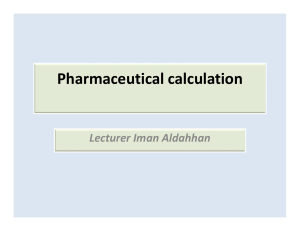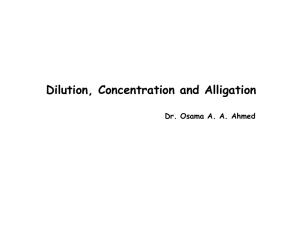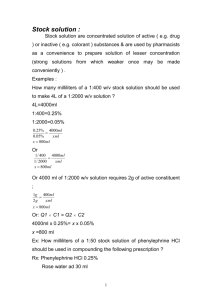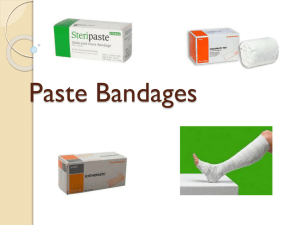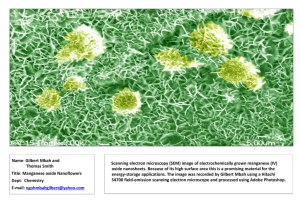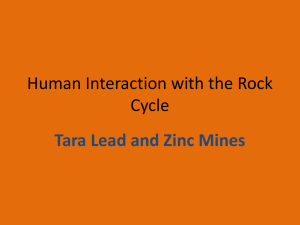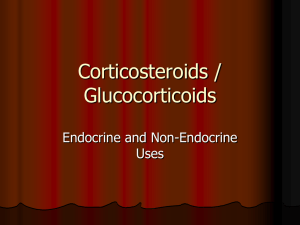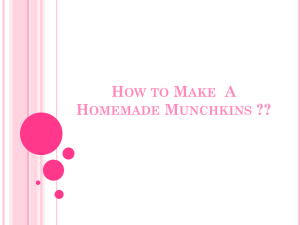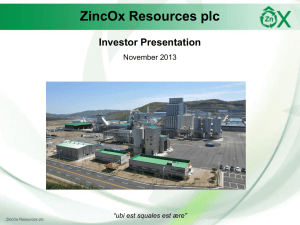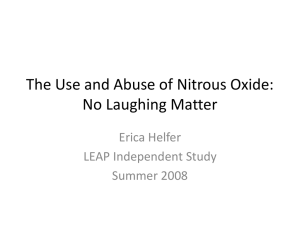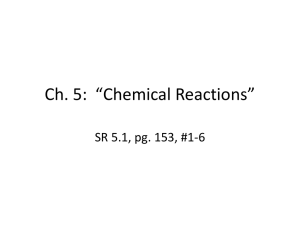lab 11
advertisement
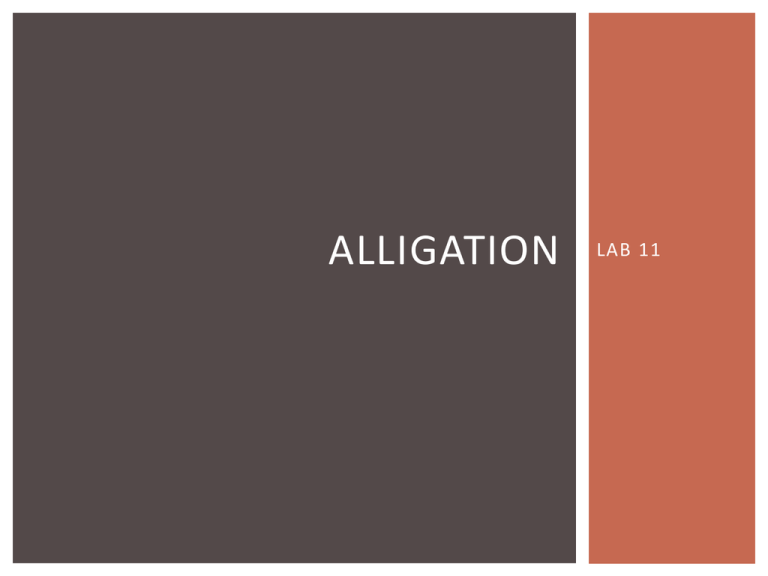
ALLIGATION LAB 11 ALLIGATION alligation is an arithmetical method of solving problems that involves the mixing of solutions or mixtures of solids possessing different percentage strength. TYPES OF ALLIGATION 1. Alligation medial. 2. Alligation alternate. ALLIGATION MEDIAL Is a method to calculate the ‘ weighted average’ percentage strength of a mixture of two or more substances of known quantity and concetration. Example: what is the percentage strength (v/v) of alcohol in a mixture of 300o mL of 40% v/v alcohol, 1000 mL of 60% v/v alcohol, and 1000 mL of 70% v/v alcohol? 0.4 X 3000 mL = 1200 mL 0.6 X 1000 mL = 600 mL 0.7 X 1000 mL = 700 mL total: 5000 mL 2500 mL 2500 mL / 5000 mL = 0.5 X 100 = 50% ALLIGATION ALTERNATE It ’s a method to calculate the number of parts of two or more components of a given strength when they mixed to prepare a mixture of desired strength. The strength of the mixture must lie between the strengths of its components. ALLIGATION ALTERNATE Example: In what proportion should alcohols of 95% and 50% strengths be mixed to make 70% alcohol ? 95 X 4 = 380 50 X 5 = 250 total: 9 630 630/9= 70% ALLIGATION ALTERNATE Example: A hospital pharmacist wants to use three lots of zinc oxide ointment containing, respectively 50%, 20% and 5% of zinc oxide. In what proportion should they be mixed to prepare a 10% zinc oxide ointment? The two lots containing more than the desired percentage (50% and 20%) may be separately linked to the lot containing less(5%) than the desired percentage. 50% 5 parts of 50% 20% 5 parts of 20% 10% 5% 10+ 40 = 50 parts of 5 % Relative amount 5:5:50 or 1:1:10 PRACTICE PROBLEMS 1. In what proportion should 20% benzocaine ointment be mixed with an ointment base to produce a 2.5% benzocaine ointment? 2. What is the percentage strength of alcohol in a mixture of 500 mL of solution containing 40% v/v alcohol, 400 mL of second solution containing 21% v/v alcohol, and sufficient quantity of non alcoholic third solution to make a total of 1000 mL? 3. In what proportion may manufacturing pharmacist mix 20%, 15%, 5% and 3% zinc oxide ointments to make a 10% ointment? 4. How many grams of 2.5% hydrocortisone cream should be mixed with 360 g of 0.25% cream to make a 1% hydrocortisone cream? PRACTICE PROBLEMS 5. A solution of benzalkonium chloride is available in concentration of 1:750 w/v. how many mililiters of purified water should be added to 30 mL of the solution to prepare 1:5000 benzalkonium chloride solution? 6. How many grams of zinc oxide should be added to 3200 g of 5% zinc oxide ointment to prepare 20% zinc oxide ointment? 7. How many grams of white petrolatum should be mixed with 250 g of 5% and 750 g of 15% zinc oxide ointments to prepare a 10% ointment? 8. How many milliliters each of a 2% w/v solution and a 7% w/v solution should be used in preparing 1 gallon of 3.5 % w/v solution? PRACTICE PROBLEMS 9. What percentage of alcohol in a mixture containing 1500 of witch hazel (14% alcohol), 2000 mL glycerin, and 5000 mL of 50% alcohol? 10. Four equal amounts of belladonna extract, containing 1.15%, 1.3%, 1.35%and 1.2% of alkaloids, respectively, were mixed. What was the percentage strength w/w of the mixture? PRACTICE PROBLEMS
